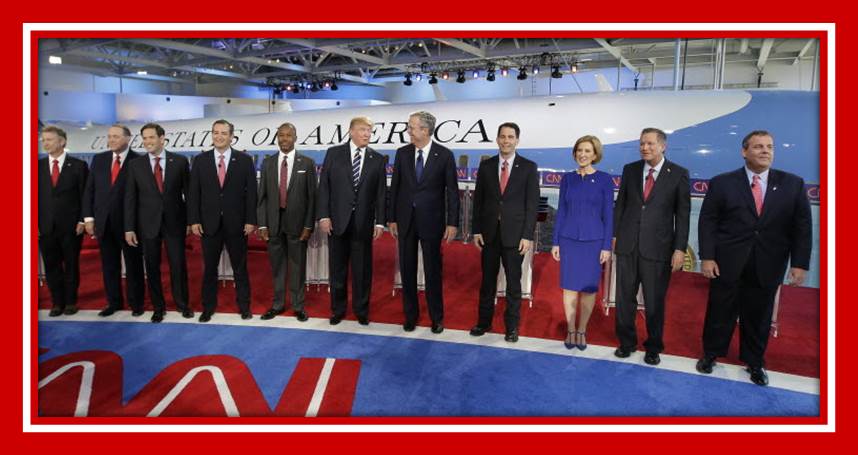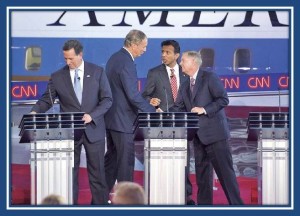Putting your politics aside, watching the Republican Debate the other night on CNN presented an interesting challenge about how to gain attention in an overcrowded field. With 11 candidates on the main stage (posed somewhat awkwardly below in front of Air Force One), the burden was on each of them to stand out, to be remembered, to have an impact, and to not get lost in the noise.
But if you squint at the photo above as the contenders are lined up from left to right, you can imagine that they’re analogous to FM radio stations, from 88 to 108. (It would, however, be a mistake to think of Rand Paul as the public radio station down at the left end of the dial).
As we like to often say when we think about many of the cities and towns in which we live and compete, “We’re in an over-radioed market.”
That’s precisely the problem here. How to tap into a consumer’s attention span when everyone’s making a lot of noise, often speaking on top of each other, and the conditions are less than ideal?
In many ways, these guys (and Carly Fiorina) are tasked with some of the same burdens, challenges, and opportunities as many of you face every week. And they’re not just competing against each other. Just as is the case with FM radio, there are other competitive challenges that go beyond terrestrial – or the Republican party – namely, the Democrats, apathy, and all the other forces that take people’s attention away from who will ultimately be their nominee come November 2016.
In any crowded field, there may be one candidate that is much like a Roman candle format, like Jammin’ Oldies or Classic Hip-Hop – a strong start, but ultimately, the gimmickry wears off and the brand falls back into the pack.
As we know from our radio experience, the candidate that can stand out above the fray, that is truly different from the others, and with a mainstream agenda that has wide appeal may have the best chance of being a strong contender.
Here are some of the elements that might separate these candidates from another, allowing perhaps one or two of them to eventually rise to the top. These same attributes apply to the competitive arena that many of you find yourselves in as you go up against a dozen or more contenders, along with new media channels. And every time you see the word “voter” or “electorate,” think “listener” or “audience.”
- Identifying the job(s) consumers have hired you to do
- Being famous for something
- Having a strong storyline that connects with voters
- Displaying a sense of humor
- Living up to your hype
- Conducting well-designed research that identifies the issues voters care about the most
- Pulling off a marketing effort that is congruent with the brand and that stands out
- Possessing a compelling personality
- Connecting with voters eye-to-eye at events around town
- Staying consistent and on-message – not wavering with every passing debate, poll, or focus group
- Putting together a great organization that can provide support over the long haul (including a strong internship program)
- Having a strong sense of community and empathy for the average constituent
- Working the media on the good – and bad – days
- Exuding credibility, transparency, and trust
- Including the electorate in the campaign
- Passing out lots of bumperstickers and swag so other voters feel a wave of popularity and support
Of course, in politics as in radio, anything can happen at any time. Unforeseen events, emergencies, world or national crises, and bolts out of the blue are all part of the challenge of a long, competitive fight. But most of the time, a solid plan that is well-conceived and executed is the only way to thrive in a crowded field.
As Edison’s Larry Rosin has long espoused, politics and radio have a lot in common. But one big difference is that a Presidential race is ultimately a zero sum game. At the end of this very long process, only one of these candidates will be left standing (assuming a dark horse doesn’t enter the race at the 11th hour), while the others will go home to lick their wounds, write a book, or get an analyst job on Fox News.
But in radio, there are multiple winners. Stations that finish #2 or even #7 can often earn a nice living, and be profitable from one campaign to the next. And there’s always another ratings book around the corner.
And, oh yes, what about these guys?
These are the four Republican candidates that lacked the support to earn them presence on the main stage of the debate. Think of them as the AM band. Ultimately, their chances are very diminished. But if they’re really amazing and can cut through, there’s still hope.
Maybe it’s a lot like Winston Churchill’s view of the arena:
“Politics is not a game. It is an earnest business.”
For radio, there’s a lot to learn from this political campaign about the battle for attention and popularity.
Have a plan. Earn their attention! Win the vote!
- What To Do If Your Radio Station Goes Through A Midlife Crisis - April 25, 2025
- A 2020 Lesson?It Could All Be Gone In A Flash - April 24, 2025
- How AI Can Give Radio Personalities More…PERSONALITY - April 23, 2025






Vote for Broadcast Savvy Boomers who know how to make it work! Thank you, Fred, spot on! http://www.broadcastideas.com
Much appreciated, Clark.